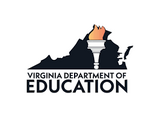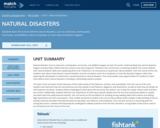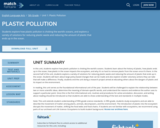
English Instructional Plan – Action Research Project
- Subject:
- Communication and Multimodal Literacy
- English
- Material Type:
- Lesson Plan
- Author:
- VDOE Project Team
- Date Added:
- 04/23/2022

English Instructional Plan – Action Research Project

Natural disasters such as volcanoes, earthquakes, hurricanes, and wildfires happen all over the world. Understanding how natural disasters happen and why helps children feel less anxious and more prepared. Therefore, this unit focuses on teaching students the science behind each natural disaster while also explaining what to do if they live in an area prone to a particular natural disaster. Over the course of the unit, students hear about many famous natural disasters, but the unit places more of an emphasis on how the disasters happen rather than exploring the devastation or destruction caused by previous natural disasters. The unit provides many opportunities for students to learn more about recent natural disasters, including a culminating research project.
The texts in this unit were chosen because of their wide variety of text features, content, and accessibility. Over the course of the unit, students will read texts that are very technical and rely heavily on text features, diagrams, and illustrations, as well as texts that are written as informational narratives. Students will be challenged to think about the structures the authors use to help the reader interact with and learn the content. Additionally, students will learn the importance of referring to specific details from the text and using those details to explain and teach back the newly learned material. This unit serves as the foundation for building strong reading habits and routines and setting high expectations for text consumption. Clear models should be included in the unit to help students build a deeper understanding of how to actively read and annotate informational texts for key ideas, text features, and vocabulary. This unit also serves as a launching point for strong discussions. Students will frequently be challenged to debate questions from the text; therefore, strong habits of discussion need to be introduced over the course of the unit.

In this unit, students explore how plastic pollution is choking the world's oceans. Students learn about the history of plastic, how plastic ends up in the ocean, how plastic in the ocean impacts the ecosystem, and why it's so hard to remove plastic from the ocean once it's there. In the second half of the unit, students explore a variety of solutions for reducing plastic waste and reducing the amount of plastic that ends up in the ocean. Students will learn about large policy-based changes that can be made and also explore smaller voluntary actions they can take that will make a difference. Finally, students end the unit doing a research project aimed at educating others about the dangers of plastic and its impact on the environment.
In reading, this unit serves as the foundational informational unit of the year. Students will be challenged to explain the relationship between two or more scientific ideas, determine the meaning of domain-specific words, and understand the reasons and evidence the author uses to support a particular point. Since this is the first informational unit, routines and procedures for active annotation, discussion, and writing about reading should be introduced so that students are able to show understanding of the text and standards in multiple modes.